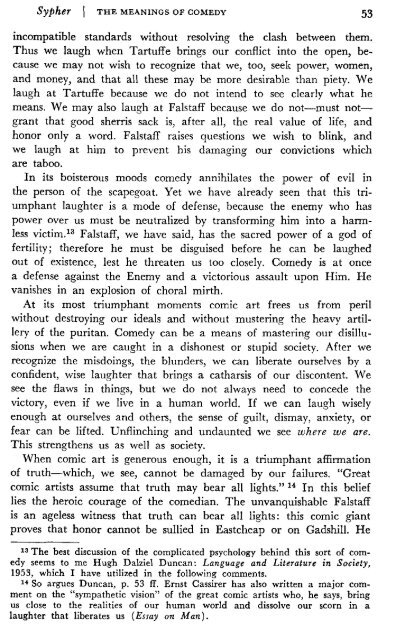The Meanings of Comedy* - Shakespeare Navigators
The Meanings of Comedy* - Shakespeare Navigators
The Meanings of Comedy* - Shakespeare Navigators
Create successful ePaper yourself
Turn your PDF publications into a flip-book with our unique Google optimized e-Paper software.
Sypher I rrrt MEANTNGS oF coMEDy<br />
53<br />
incompatible standards without resolving the clash between them.<br />
Thus we laugh when Tartuffe brings our conflict into the open, because<br />
we may not wish to recognize that we, too, seek power, women,<br />
and money, and that all these may be more desirable than piety. We<br />
laugh at Tartuffe because we do not intend to see clearly what he<br />
means. We may also laugh at Falstaff because we do not-must notgrant<br />
that good sherris sack is, after all, the real value <strong>of</strong> life, and<br />
honor only a word. Falstaff raises questions we wish to blink, and<br />
we laugh at him to prevent his damaging our convictions which<br />
are taboo.<br />
In its boisterous moods comedy annihilates the power <strong>of</strong> evil in<br />
the person <strong>of</strong> the scapegoat. Yet we have already seen that this triumphant<br />
laughter is a mode <strong>of</strong> defense, because the enemy who has<br />
power over us must be neutralized by transforming him into a harmless<br />
victim.l3 Falstafl we have said, has the sacred power <strong>of</strong> a god <strong>of</strong><br />
fertility; therefore he must be disguised before he can be laughed<br />
out <strong>of</strong> existence, lest he threaten us too closely. Comedy is at once<br />
a defense against the Enemy and a victorious assault upon Him. He<br />
vanishes in an explosion <strong>of</strong> choral mirth.<br />
At its most triumphant moments comic art frees us from peril<br />
without destroying our ideals and without mustering the heavy artil-<br />
Iery <strong>of</strong> the puritan. Comedy can be a means <strong>of</strong> mastering our disillusions<br />
when we are caught in a dishonest or stupid society. After we<br />
recognize the misdoings, the blunders, we can liberate ourselves by a<br />
confident, rvise laughter that brings a catharsis <strong>of</strong> our discontent. We<br />
see the flaws in things, but we do not always need to concede the<br />
victory, even if we live in a human world. If we can laugh wisely<br />
enough at ourselves and others, the sense <strong>of</strong> guilt, dismay, anxiety, or<br />
fear can be lifted. Unflinching and undaunted we see where ue are.<br />
This strengthens us as well as society.<br />
When comic art is generous enough, it is a triumphant affirmation<br />
<strong>of</strong> truth-which, we see, cannot be damaged by our failures. "Great<br />
comic artists assume that truth may bear all lights." la In this belief<br />
lies the heroic courage <strong>of</strong> the comedian. <strong>The</strong> unvanquishable Falstaff<br />
is an ageless witness that truth can bear all lights: this comic giant<br />
proves that honor cannot be sullied in Eastcheap or on Gadshill. He<br />
13 <strong>The</strong> best discussion <strong>of</strong> the complicated psychology behind this sort <strong>of</strong> comedy<br />
seems to me Hugh Dalziel Duncan: Language and Literature in Society,<br />
1953, which I have utilized in the following comments.<br />
1a So argues Duncan, p. 53 ff. Ernst Cassirer has also written a major comment<br />
on the "sympathetic vision" <strong>of</strong> the great comic artists who, he says, bring<br />
us close to the realities <strong>of</strong> our human world and dissolve our scorn in a<br />
laughter that liberates us (Essal on Man).


